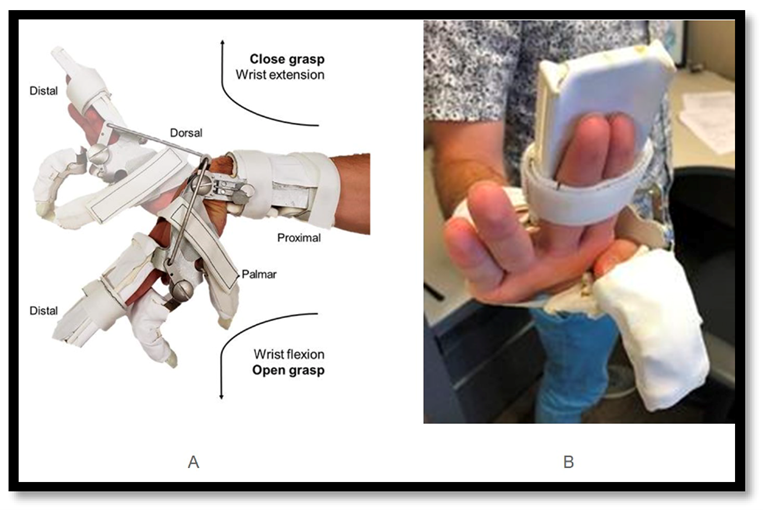This first-of-its-kind partial-hand prosthesis simulator (PhPS) is designed to mimic the physical and functional properties of a prosthetic device typically used by those who have had an amputation of the first three fingers at the metacarpophalangeal joint—the most common level of amputation of the hand. The simulation provided by Georgia Tech’s device aims to facilitate learning to aid in prosthesis use both before and after amputation. In particular, the 30-day post-surgery “golden period” of recovery is a critical time for this learning to take place.
For scheduled amputations, the PhPS is designed to firmly secure the thumb, index, and middle fingers to make them immobile, thereby eliminating their functionality and useful sensation and allowing for simulation of their total loss. This restriction should force the user to effectuate grasp actions in the same way they would post surgery: using wrist flexion and extension to open and close artificial fingers.
In more common unscheduled amputations, the device may allow the patient to train with their functional (intact) hand, acquiring motor skills that may then more readily transfer to the amputated side. The goal is to enable training in prosthesis use while the amputated side is recovering from surgery.
- Specific: Designed to maintain limb length by placing artificial fingers in positions similar to where they would be in an intact hand performing grasping actions (rather than extending the length of the limb as many prostheses do)
- User friendly: Features rubber-capped fingertips that may provide a more lifelike representation of grasp and enhance usability
- Nuanced: Designed to limit tactile sensation and feedback from immobilized fingers, which may allow better evaluation of how the device is functioning for the patient in comparison to an actual prosthesis
- Adjustable: Can be pre-fitted and tailored to a range of hand sizes, which may allow for earlier introduction of the device and potentially improved rehabilitation outcomes
- Educational: Allows therapists to demonstrate rehabilitation and training protocols and to help prepare patients for amputation surgeries
- Practical: Takes advantage of the speed and affordability of 3D-printed components for economical fabrication that can be simple to replicate
Georgia Tech’s PhPS may be useful for both research and clinical settings, specifically:
- Pre- and post-surgery training for unilateral partial-hand amputees
- Rehabilitation and clinical management research
For amputees, prostheses can become a vital part of day-to-day life. But unfortunately, about 33% of upper-limb amputees reject prostheses, and about 75% of prosthetic wearers use them for aesthetics only. The devices do not actually provide functional mobility, representing a significant lost opportunity to improve the quality of life for these patients.
A critical knowledge gap exists: Researchers simply do not have enough data to understand precisely the motor control problems that amputees have with prostheses and how they impact prosthesis use. So, any device that can more accurately mimic the natural movements of the hand may help improve prosthesis success rates while increasing the field of knowledge.
While partial-hand amputation accounts for more than 90% of upper-extremity amputation surgeries, the rehabilitation market currently does not offer any device that simulates the loss of digits of the hand. Available technologies include simulators for entire hand or forearm loss, but these devices typically add length to the arm, which may create an unnatural and unrealistic experience compared to the prosthesis these patients will need to use.
Georgia Tech’s PhPS aims to fill this significant market gap with a device designed to restrict movement and sensation to mimic a partial-hand amputation, and it does so in a way that aims to provide a more realistic experience and therefore may improve patient outcomes.

A prototype of Georgia Tech’s partial-hand prosthesis simulator
